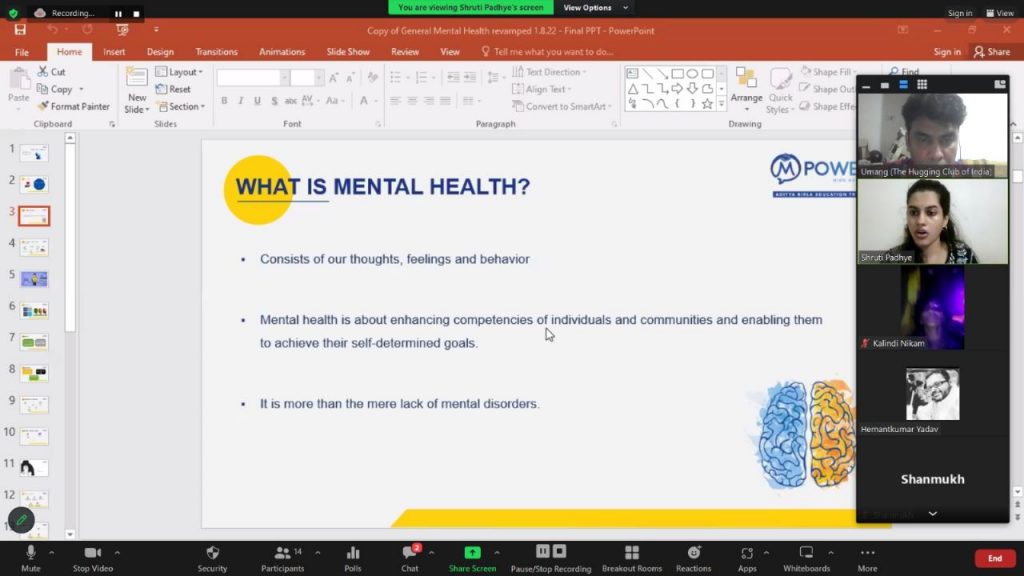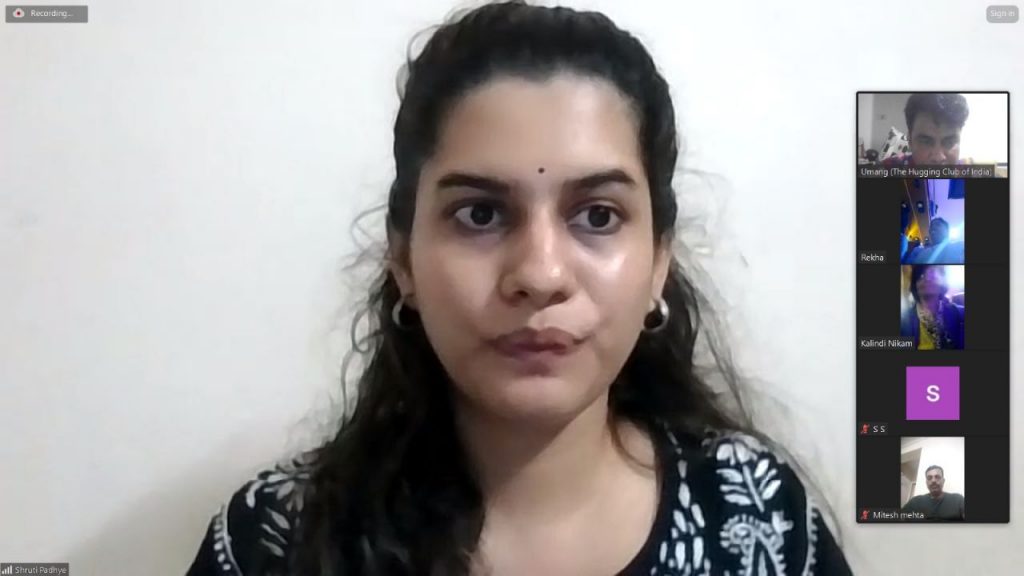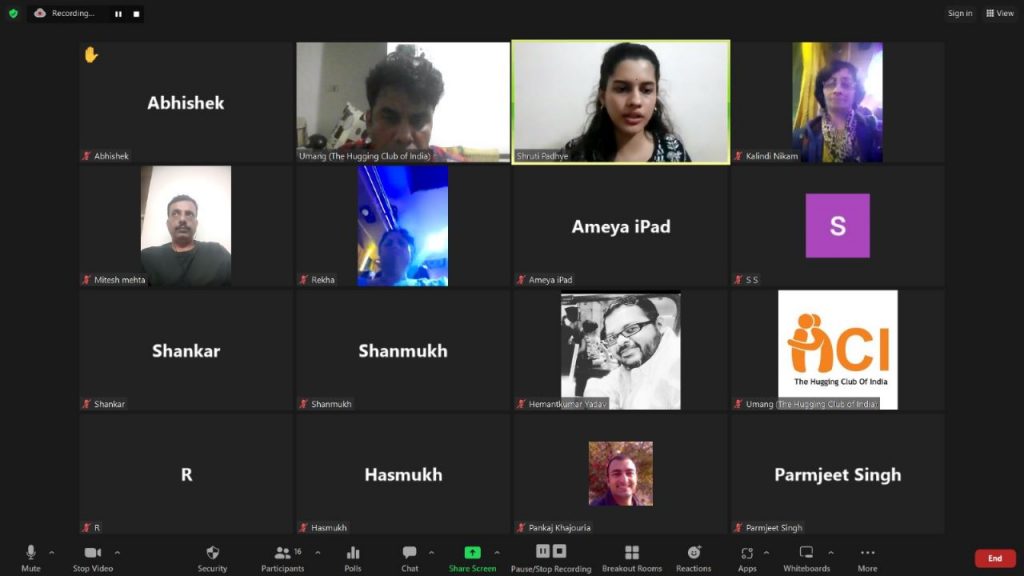Mental health consists of our thoughts, feelings and behaviour. It is about enhancing competencies of individuals and communities and enabling them to achieve their determined goals. It is more than the mere lack of mental disorders. It has also been defined as a state of well-being whereby individuals recognise the abilities, are able to cope with the normal stresses of life, work productively and fruitfully and contribute to their communities.

Shruti Padhye is a Mumbai based psychologist and psychotherapist with over 5 years of experience and she is also certified in LGBTQ+ therapeutic support. She is associated with Mpower as well. She was kind enough to take time out and join us in an online session on 26th July, 2023.
Here are some of the highlights of her session:
Counselling v/s Therapy:
Counselling is for surface level issues (e.g. to discuss a life issue on which you need clarity), whereas therapy is for something more deeper, like an emotional trauma. Therapy is a two-way process. Issues are analysed at the root level and there are suggestions where possible solutions are explored. Therapy is to make one self-aware. The therapist makes you more aware of your traumas, e.g. the relationship that you shared with your parents, how your environment was when you grew up, whether you were given attention or if you grew up on your own and ended up parenting your parents, etc.

Myths about Mental Health and Therapy
1. A myth about therapy is that you explain the problems and the therapist will tick mark the solutions one by one and give it to you, but that’s not how it works. It is a two-way process. They help and guide you and give you a non-judgemental, therapeutic space full of empathy. They allow you to explore yourself more. As a patient, you will also need to make an effort, give time and patience to the process to learn about your behaviour patterns. A therapist focusses on making us aware of 4 things primarily: Behaviour, Thinking, Emotion and any distress/problem in day-to-day life. Change is not the major focus of a therapist, but awareness and acceptance of the causes or unhealthy patterns in emotions or behaviour is the focus. Analysing one’s own emotions or behaviour patterns is not easy and the therapist helps with that. Once the person becomes aware and accepts the unhealthy behaviour or thought patterns, he can bring about changes himself, maybe through better life choices. Change is simply the outcome. But the focus is on the process. A therapist does not give you direct answers because then you will not learn and the pattern may repeat in future. A therapist can bring about a change of perspective when looking at an issue.

2. Mental health disorders are caused by black magic, evil nazar or past life karma: This is completely unscientific and untrue, but is unfortunately believed by many due to lack of awareness.
3. Some people believe that they can never get any mental health problems but it is quite usual to face such concerns in life and therapy / treatment is encouraged.
4. People with mental health illnesses cannot be helped: If someone does get any mental health disorder, they believe that it is life long and cannot be cured, but this mindset is incorrect. There are diagnosis available and mental health illnesses can be treated with medicines and therapy. Medicines control your physiology, that is, the chemicals in our body and therapy helps with our emotions, behaviour and thinking. The combination of medicines and therapy is important.

5. People with mental health problems are violent: Not applicable in a wide majority of situations.
6. Mental health problems will go away on their own: Some believe that you can sleep over a stressful situation or go to parties, have alcohol, etc and you will get over the stressful situation but these need to be addressed or the underlying problems may not go away on their own.
Barriers to Help seeking / Why it is difficult for some to seek Therapy:
1. Thinking that the person may think badly of them
2. Lack of awareness
3. Lack of resources
4. Feeling embarrassed or shy
5. Thinking that nothing can help
6. Assuming it’s a ‘passing phase’

Common Mental Health Concerns
1. Depression
2. Anxiety
3. Substance Use Disorder / Addiction
Some Symptoms of Depression:
– An unusually sad, irritable mood that does not go away
– Loss of interest in activities that used to be enjoyable
– Lack of energy and tiredness
– Feeling worthless/guilty when they are not at fault
– Thinking a lot about death or wishing they were dead
– Difficulty concentrating or making decisions
– Having sleep difficulties or sleeping too much
– Moving slowly or feeling agitated or unable to settle
– Loss of interest in food or appetite

Some Symptoms of Anxiety:
| PHYSICAL | PSYCHOLOGICAL | BEHAVIOURAL |
| Tight Chest | Intrusive thinking | Avoidance of situations |
| Shallow breathing | Ruminating thoughts | Isolation, withdrawal |
| Racing heart | Feeling sense of impending doom | Restlessness, agitation |
| Difficulty sleeping | Constant comparison | Irritability |
| Trembling | Indecisiveness | Easily startled |
| Sweating | Difficulty concentrating | Obsessive-Compulsive Behaviour |
| Muscle knots | Confusion | |
| Nausea, dizziness | ||
| Headaches | ||
| Diarrhoea, stomach aches |
Substance Use Disorder
– A pattern of use of a drug in which a person consumes the substance in amounts or through methods that are harmful to themselves or others
– Substance abuse can lead to substance dependence
– Substance abuse may indicate an underlying mental health concern
Signs of Substance Use Disorder:
– Cravings to use the substance
– Wanting to cut down or stop, but not managing to
– Taking the substance in larger amounts or for longer duration than you are meant to
– Neglecting other parts of your life e.g. work/school, relationships, friend circle, responsibilities
– Continuing to use substances even when it causes problems in relationships
– Using substances even when it puts you in danger
– Promising to quit but cannot

Treatment Methods
– Medication / Psychotherapy
– Support groups / Group Therapy
– Allied Therapy / Psychiatric Hospitalisation
Shruti was patient enough to give sufficient time to address all queries from the participants and we are grateful for her valuable insights. Shruti is closely associated with us and can be reached for a professional session. Anyone who needs helps should feel free to reach out to Hugging Club of India.
– Written by Amit Rai
– Compiled by Amol More
– Edited and uploaded by Mahrukh
